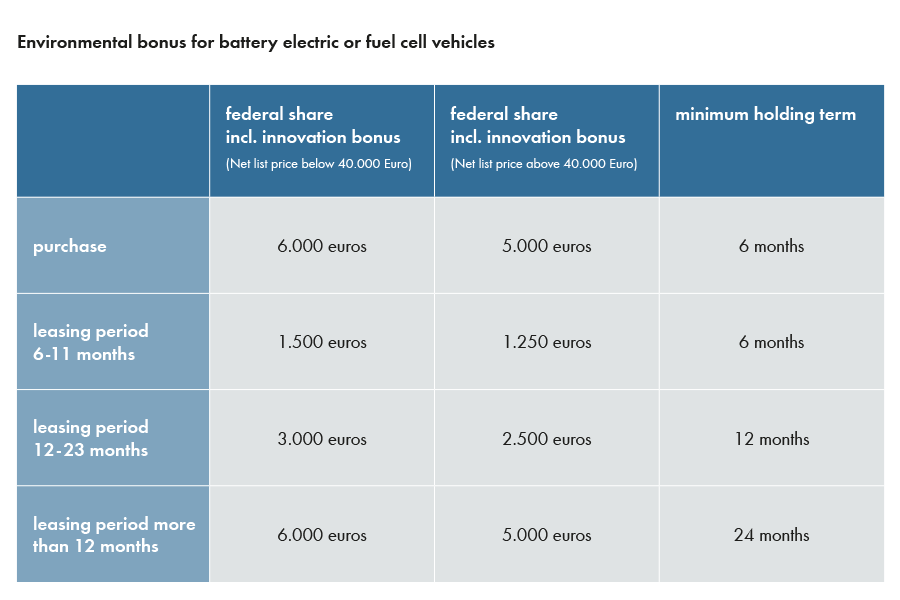Leasing electric vehicles: good for your balance sheet

E-mobility is bringing dynamism into the leasing market, which has long operated on a decentralized basis. While vehicle financing used to traditionally be the domain of the in-house banks of big manufacturers like BMW, Daimler and Volkswagen, nowadays normal European banks are also entering the leasing market. Companies are also increasingly interested in leasing fleet vehicles or machinery. After all, in these financially unstable times, it’s important for companies to stay solvent. And ideally, the rates for leased EV fleets are financed by the profits realized from the leased products. If you – like many other company owners – are thinking about electrifying and leasing your fleet, then we have a few useful tips for you.
State subsidies for e-leasing
When you lease an electric vehicle, you receive the same state subsidy that you would receive for a cash purchase. The amount of the subsidy, however, is determined by the term of the leasing contracts. Only contracts with a term of at least 23 months receive the full environmental bonus; for shorter terms, the subsidy is staggered.
The minimum holding period for a lease is 12 months for leasing contracts of 12 to 23 months and 24 months for a leasing term of more than 24 months. It is imperative that these limits are adhered to because otherwise the Federal Office for Export Control (BAFA) may demand that the premiums be returned.
Like purchased vehicles, leased electric vehicles also have to be included in the regularly updated BAFA list of eligible vehicles.

Leasing electric vehicles: contract types
If you decide to lease your EV fleet, you can choose from a wide range of contract types. We explain the most important ones below.
Full amortization contracts
When you conclude a full amortization contract, you as company owner pay all the costs associated with the acquisition and servicing of the vehicles as well as the lessor’s profit share during the term of the contract. At the end of the term, the vehicle becomes your property.
Partial amortization contracts
Here, only part of the total cost of the vehicle is paid for during the term of the leasing contract, not the entire cost. At the end of the term, a residual value remains and the vehicle is returned to the leasing company.
Kilometer contracts
When you conclude a kilometer contract, a specific mileage is agreed upon with a specific time (e.g., around 50,000 kilometers per year for three years). Deviations from the agreed mileage are settled at the end of the term. Kilometer contracts are available with or without the option to buy.
Residual value contracts
Residual value contracts are the most popular form of leasing contracts, whereby you agree upon a specific residual value with the leasing company. If the vehicle is sold for less at the end of the term, you have to pay the difference. Any surplus proceeds are shared between you and the company.

The financial advantage
All electric vehicles with a registration date between May 18, 2011, and December 31, 2025, are exempt from vehicle tax for a maximum of ten years up to December 31, 2030, after which your drivers will be required to pay just 50% of the usual vehicle tax rate.
In addition to this tax break, another one is available for anyone who drives an electric company vehicle: The standard 1% rule for the private taxation of company vehicles with combustion engines is reduced to just 0.5% or even 0.25% for electric vehicles.
For electric vehicles with a gross list price of more than €60,000 (including optional extras), 0.5% of the value as new must be taxed as a noncash benefit. A tax rate of 0.015% applies for travel between home and work.
Drivers of company vehicles with a gross list price of up to €60,000 are even better off because they are required to tax just 0.25% of the value as new as a noncash benefit. So for travel with a company vehicle between home and work, the tax rate is just 0.0075% per kilometer.
An alternative to leasing: vehicle subscriptions
Not only can you purchase or lease electric vehicles, but you can also take out subscriptions for them. A vehicle subscription is essentially a long-term rental at a fixed monthly price that includes all maintenance expenses (though normally not the electricity). So unlike when you lease or purchase an electric vehicle, you don’t have to worry about insurance, maintenance or TÜV certification. Many leasing providers also offer vehicle subscriptions for the period during which a customer has to wait for their desired EV model. Thanks to the high degree of flexibility available with many contracts (with minimum terms of anywhere between one and six months), vehicle subscriptions are also ideal for anyone who wants to try out a few models first before taking the plunge into the world of e-mobility. You can find an overview of vehicle subscription providers on this website.


